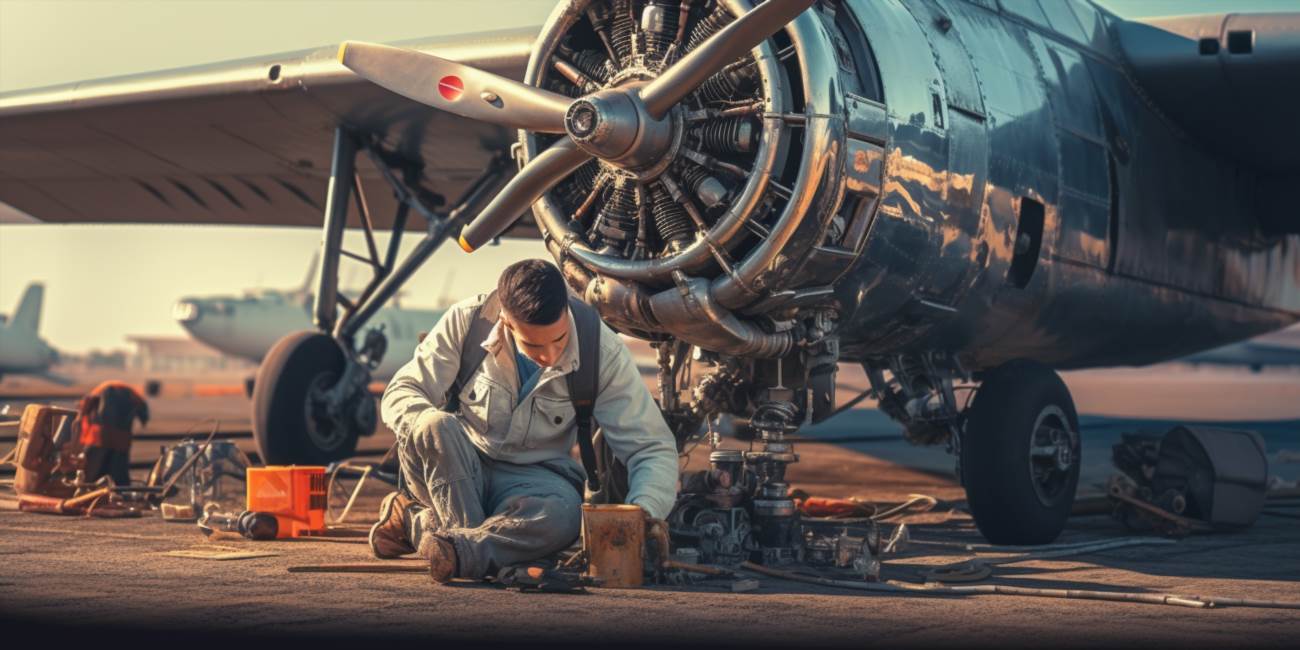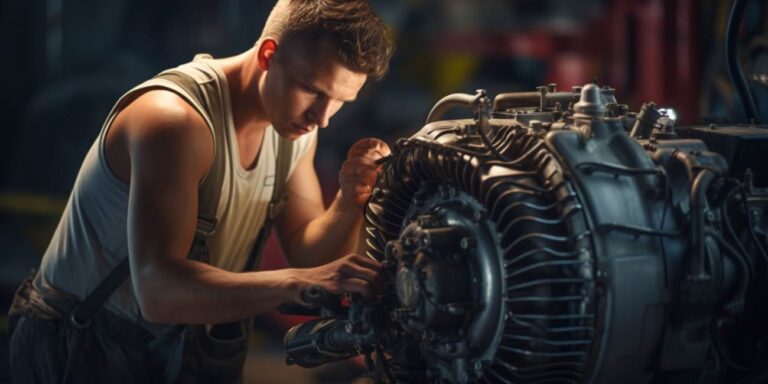One of the key attractions of becoming an aircraft mechanic is the promising career outlook. The aviation industry is constantly evolving, and with the increasing number of aircraft in operation, there is a continuous need for qualified professionals to ensure the safety and efficiency of these flying marvels. This high demand translates into a wealth of opportunities for those who choose to venture into the world of aircraft maintenance.
Now, let’s address the burning question: do aircraft mechanics make good money? The answer is a resounding yes. A career as an aircraft mechanic can be financially rewarding, offering competitive salaries that reflect the specialized skills and expertise required for the job. In the United States, for instance, the median annual wage for aircraft mechanics is $64,090, according to the Bureau of Labor Statistics.
It’s important to note that various factors can influence the earning potential of aircraft mechanics. Experience plays a crucial role, with seasoned professionals often commanding higher salaries. Additionally, the type of aircraft and the complexity of the maintenance tasks can impact compensation. Those specializing in advanced avionics or working on larger, more sophisticated aircraft may find their skills in even higher demand, translating into higher remuneration.
Moreover, geographical location can be a determining factor in aircraft mechanics salaries. Areas with a high concentration of aviation activities, such as major airports or aerospace manufacturing hubs, often offer higher wages to attract and retain skilled professionals. Aspiring aircraft mechanics may find it beneficial to explore opportunities in regions where the aviation industry thrives.
Aircraft mechanics job description, duties and responsibilities
Aircraft mechanics play a crucial role in ensuring the safety and functionality of aircraft. These skilled professionals are responsible for inspecting, repairing, and maintaining various components of an aircraft, ranging from engines to avionics systems. The job description of an aircraft mechanic involves a diverse set of duties and responsibilities that contribute to the overall airworthiness of the aircraft.
One of the primary duties of an aircraft mechanic is to perform thorough inspections on different aircraft components. This includes examining engines, landing gear, navigation systems, and other critical parts to identify any signs of wear, damage, or malfunction. Using their keen attention to detail, mechanics must detect and diagnose issues that could potentially compromise the safety of the aircraft.
Upon identifying problems, aircraft mechanics are tasked with executing repairs and replacements. This involves using a variety of tools and equipment to address mechanical, electrical, or structural issues. They may need to disassemble and reassemble parts, troubleshoot systems, and ensure that all components meet the required standards and specifications.
In addition to repairs, aircraft mechanics are involved in routine maintenance procedures to prevent issues before they arise. This includes tasks such as changing oil, inspecting brake systems, and performing regular checks on various aircraft systems. By adhering to maintenance schedules, mechanics contribute to the longevity and optimal performance of the aircraft.
Collaboration is a key aspect of an aircraft mechanic’s role. They often work closely with other aviation professionals, including engineers and technicians, to address complex issues and implement improvements. Effective communication and teamwork are essential for ensuring that the aircraft meets safety standards and operates efficiently.
As technology continues to advance, aircraft mechanics are increasingly involved in avionics systems. This includes the repair and maintenance of communication, navigation, and entertainment systems within the aircraft. Familiarity with cutting-edge technology is essential for mechanics to keep pace with the evolving aviation landscape.
Ensuring compliance with regulatory standards is another critical responsibility of aircraft mechanics. They must stay informed about aviation regulations and make certain that all repairs and maintenance activities adhere to these guidelines. This commitment to compliance contributes to the overall safety and integrity of the aviation industry.
What does an aircraft mechanic do on a typical working day

An aircraft mechanic plays a crucial role in ensuring the safety and functionality of aircraft. A typical working day for these skilled professionals involves a variety of tasks, utilizing specialized tools and equipment to perform meticulous maintenance tasks.
One of the primary responsibilities of an aircraft mechanic is to conduct routine inspections on aircraft. Armed with a set of precision tools such as wrenches and screwdrivers, they meticulously examine various components, ensuring that everything meets stringent safety standards. These tools are not just instruments; they are an extension of the mechanic’s expertise, allowing them to identify and address potential issues.
When it comes to equipment, aircraft mechanics rely on advanced technology to diagnose complex problems. Diagnostic equipment like engine analyzers and computerized testing devices are indispensable. These sophisticated tools provide in-depth insights into the aircraft’s systems, enabling mechanics to pinpoint malfunctions with precision.
Performing maintenance tasks goes beyond fixing visible issues. Aircraft mechanics are adept at conducting preventative maintenance, ensuring that potential problems are nipped in the bud. This involves tasks such as engine overhauls and avionics upgrades. The tools used for these tasks range from traditional hand tools to state-of-the-art power tools, each serving a specific purpose in the meticulous process.
Additionally, aircraft mechanics are often required to collaborate with other professionals, creating a dynamic work environment. Communication becomes a vital tool in their arsenal as they discuss findings, share insights, and coordinate tasks. This ensures a comprehensive approach to maintenance tasks, where collective expertise enhances the overall safety and efficiency of the aircraft.
In essence, an aircraft mechanic’s day is a symphony of precision, where tools, equipment, and expert knowledge harmonize to keep aircraft soaring safely through the skies. The meticulous attention to detail in maintenance tasks ensures that every component functions seamlessly, emphasizing the indispensable role of these skilled professionals in aviation.
Aircraft mechanic salary and job outlook
For aspiring aviation enthusiasts eyeing a career in the skies, becoming an aircraft mechanic is a path laden with both challenges and rewards. Let’s delve into the intricate details of the salary, job demand, and employment trends in this dynamic profession.
First and foremost, let’s talk about the crucial factor that often tops the list of considerations – salary. Aircraft mechanics, equipped with their expertise in ensuring the safety and functionality of aircraft, command a respectable compensation. On average, the annual salary for aircraft mechanics in the United States hovers around $65,230, according to the Bureau of Labor Statistics. However, this figure is subject to variations based on factors like experience, specialization, and geographical location. Those with advanced certifications and considerable experience tend to land in the higher echelons of the salary spectrum.
Now, shifting our gaze to the horizon of job demand, the outlook for aircraft mechanics is undeniably promising. With the global aviation industry perpetually expanding, the need for skilled professionals to maintain and repair aircraft is on a steady ascent. This robust job demand stems from the continuous growth in air travel and the increasing complexity of modern aircraft. As airlines and aviation companies strive to keep their fleets in optimal condition, the demand for adept aircraft mechanics remains unabated.
Understanding the employment trends further illuminates the landscape for prospective aircraft mechanics. The industry is witnessing a paradigm shift with the integration of advanced technologies in aviation. This transition translates into a demand for mechanics well-versed not only in traditional aircraft systems but also in cutting-edge avionics and computerized components. As aircraft become more sophisticated, the skill set required of mechanics evolves accordingly. Adaptability and continuous learning are becoming key tenets of success in the realm of aircraft maintenance.
Examining the geographical nuances of employment trends, regions with prominent aviation hubs naturally showcase a heightened demand for skilled mechanics. Aviation powerhouses like Dubai, Singapore, and major cities in the United States boast a plethora of opportunities for those seeking a career in aircraft maintenance. As the aviation industry continues to globalize, these hubs are becoming magnets for talent, shaping the employment trends on a global scale.
Summing up, the journey of an aircraft mechanic is not just a profession; it’s an odyssey through the skies, intertwined with the intricacies of technology and a commitment to safety. The salary, job demand, and employment trends collectively paint a picture of a profession that not only offers financial stability but also promises a dynamic and evolving career path.






